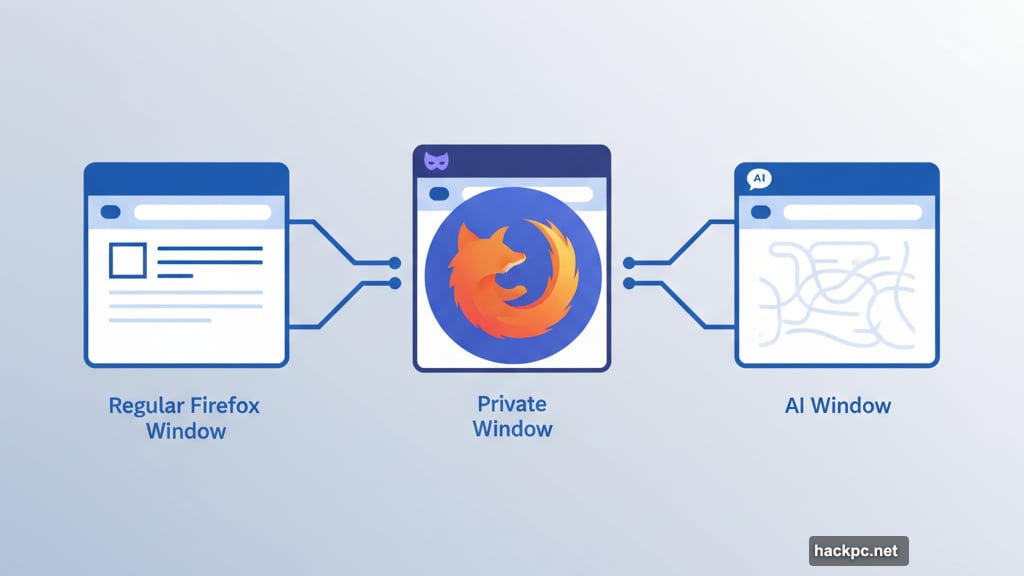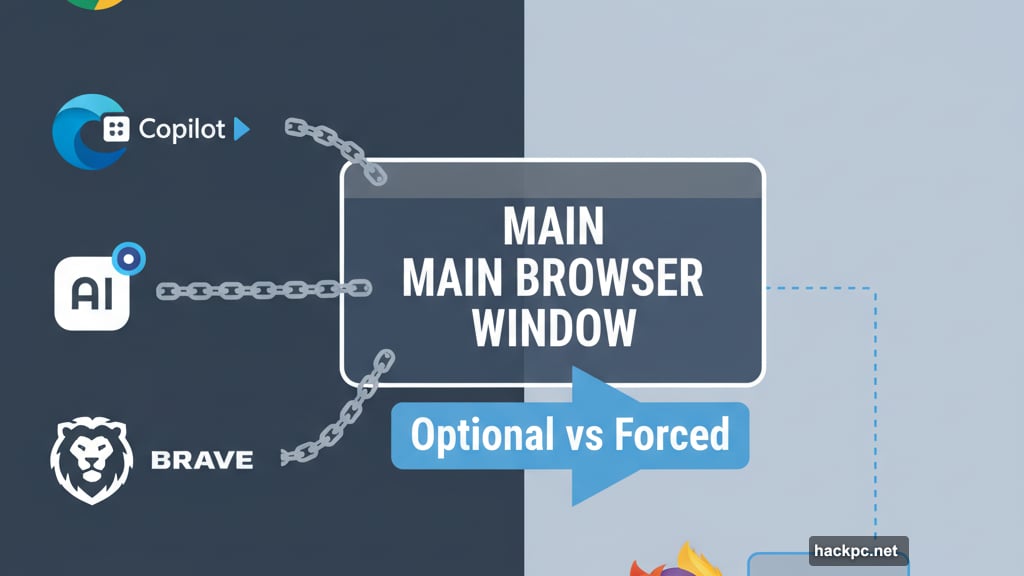
Firefox just announced AI Window. It’s exactly what it sounds like—a separate browser window where you can talk to an AI assistant.
Here’s the twist. Mozilla actually made this optional. Plus, it sits alongside regular Firefox windows and Private windows instead of forcing itself into every tab. That’s refreshing in an industry obsessed with shoving AI everywhere.
But let’s be honest. Most people won’t use it.
What AI Window Actually Does
Think of it as ChatGPT built into your browser. You open a separate window, ask questions, get answers. The AI can supposedly help with browsing tasks.
Mozilla hasn’t revealed which AI model powers this feature. That’s a red flag. If you’re asking users to trust an AI assistant, transparency matters. Yet the company stays vague about the underlying technology.
The feature remains in development. Early access signups opened through Mozilla’s blog. So you can test it and provide feedback if you’re curious. But don’t expect a polished experience yet.
Why This Matters Less Than Mozilla Thinks
Browser makers are in full panic mode about AI. Every company races to integrate chatbots, summarization tools, and AI assistants. They act like users can’t wait to chat with their browser.
Reality tells a different story. Most people just want their browser to load pages fast and not crash. AI features? Those rank somewhere below custom themes and password managers in actual usage.
Mozilla already tried this earlier in 2025 with iOS Firefox. Shake your phone, get an AI summary of the current page. Sounds convenient. But how many people actually shake their phone instead of just reading the page? My guess is almost nobody.
The One Thing Mozilla Got Right

At least they made it optional. Open a new AI Window when you want it. Ignore it completely when you don’t. Standard Firefox windows work exactly like before.
Compare that to other browsers. Chrome builds Gemini deep into search. Edge forces Copilot into your sidebar. Brave includes AI features you can’t fully remove. They all assume you want AI assistance constantly.
Mozilla’s approach shows more restraint. AI Window exists as a separate tool rather than polluting the main browser interface. That’s worth acknowledging even if the feature itself feels unnecessary.
Where This Goes Wrong
Here’s the problem with browser-based AI assistants. They try to solve problems that don’t exist.
Need to summarize a long article? Just read the introduction and conclusion. Want to chat about a topic? Open ChatGPT in a new tab. Looking for information? Use a search engine. These workflows already work fine.
Plus, AI assistants in browsers create privacy concerns. What data does the AI see? What gets sent to Mozilla’s servers? How long do they store conversation logs? The blog post doesn’t answer these questions clearly.
Mozilla talks about “giving users more control” over AI interactions. But real control means knowing exactly what data leaves your device and where it goes. Optional features still need transparent data handling.
The Bigger Picture Nobody Mentions
Browser companies push AI because they fear irrelevance. Search engines now offer AI chat. Operating systems bake in AI assistants. Mobile apps integrate chatbots directly.
So browsers panic. They need a reason for users to keep them around instead of just using platform-level AI tools. Hence the desperate race to add AI everywhere.
But this strategy misses the point. Browsers matter because they’re fast, secure, and respect user choice. Adding more features doesn’t strengthen that value proposition. It just creates bloat.

Firefox used to stand for user privacy and control. AI Window technically preserves that by staying optional. Yet it still represents Mozilla chasing trends instead of focusing on core browser quality.
What Users Actually Want
Fast page loads. Low memory usage. Strong privacy protections. Reliable security. Clean interface without distractions.
Nobody wakes up thinking “I wish my browser had an AI window.” They want tabs that don’t crash when you have 50 open. They want websites to render correctly. They want their passwords stored safely.
Mozilla could invest resources in those areas instead. Improve Firefox performance so it finally matches Chrome’s speed. Build better privacy tools that actually block trackers effectively. Fix the random bugs that still plague the browser.
But that work isn’t flashy. It doesn’t generate press releases. So we get AI Window instead.
Will This Change Anything?
Probably not. AI Window will launch. Some users will try it. Most will forget it exists after a week. Mozilla will collect feedback, make improvements, and eventually the feature will fade into obscurity alongside other forgotten browser experiments.
Meanwhile, Firefox’s market share continues shrinking. Not because it lacks AI features. Because Chrome dominates through Google’s ecosystem integration and aggressive marketing. Adding AI won’t reverse that trend.
The real competition isn’t about AI assistants. It’s about speed, compatibility, and ecosystem lock-in. Mozilla loses that battle regardless of how many AI features they add.
AI Window represents Mozilla following rather than leading. It’s not a terrible feature. Just an unnecessary one that solves problems nobody actually has while ignoring the issues users complain about daily.
Your browser doesn’t need to chat with you. It needs to work reliably and protect your privacy. Focus on that instead.



Comments (0)